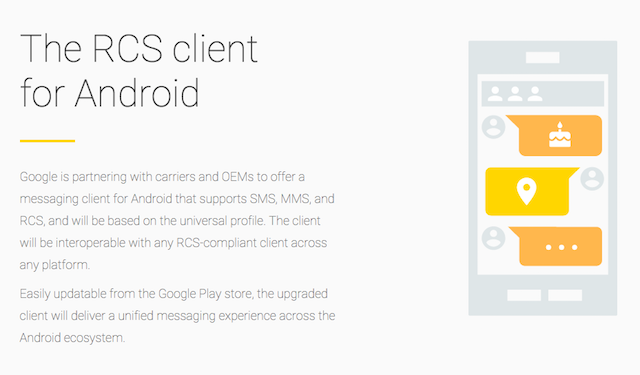The first SMS text message was sent in 1992. At the time, the idea of sending text messages to people all over the world for a flat fee was nothing short of revolutionary. But that was then, and in the 20+ years since, it has been supplanted by online services like WhatsApp and Facebook Messenger.
No surprise. There’s something tangibly passé about text messaging, especially with its lack of group messaging and the arbitrary limit of 160 characters per SMS. Other carrier-based message services, like Multi Media Messaging (MMS), are also a bit dated, struggling to handle rich media like photos and video.
But now there’s something new. Something that might actually replace, or at the very least augment, old-school text messaging. It’s called Rich Communication Services (RCS), and it might be coming to an Android phone near you thanks to the efforts of Google. Here’s what you need to know.
How RCS > SMS & MMS
Over the past few years, there's been a gradual drift from carrier-delivered communications (like texts and voice calls) to services provided by third parties (called over-the-top (OTT) services) -- and carriers are worried because they can't profit from SMS or MMS if people aren't using them anymore.
And that's why RCS is so fascinating, as it's another step forward for mobile standards. To be clear, it's not replacing SMS. Rather, it's a competing standard that's being developed by the GSM Association (GSMA). It actually started way back in 2007 and has been flying under the radar up 'til now.
So what can RCS do? For starters, it'll make it easier to send files from phone-to-phone [Broken URL Removed]. It'll also offer an IM-like text messaging experience with support for group messaging, which is long-overdue. Consumers will also be able to better block unwanted communications, which is great news for those concerned about cyberstalking and cyberbullying.
RCS will also augment voice calls with the addition of live video streaming. Networks and manufacturers have tried to introduce carrier-based video calling in the past, but their efforts have largely been unsuccessful in areas outside of Japan and South Korea.
The GSMA also expects RCS to have a transformative effect on mobile advertising, gaming, and educational software. It hopes that developers will use it over their own bespoke systems, using mobile data as a method of communication.
Perhaps the biggest change with RCS is that it's entirely based on Internet Protocol (IP) communications, which is a huge step up from current voice and SMS technology that's based on highly-flawed and inefficient circuit-switching network technology. Check out this lecture for more details:
But the biggest benefit of RCS is cost. Circuit-switched networks are expensive to run, and this high cost is passed onto consumers like you and me.
There are reasons to be concerned about RCS though. Since it's a carrier service rather than an over-the-top service, it'll be subject to lawful interception by the government, meaning it will be easy to spy on. From the GSMA webpage:
Mobile network operators are subject to a range of laws and licence conditions that require them to be capable of intercepting customer communications, to retain a range of subscriber and usage data and to disclose this data to law enforcement agencies on demand. While RCS allows lawful intercept at both the service data layer and session data layer, any interference with mobile users' right to privacy must be in accordance with the law.
Concerns have also been raised about how much it'll cost consumers. Right now, if you send a message over Facebook, you'll simply be billed for the data you use and it comes out of your data allowance. But RCS is designed to be per-unit billable in the same way SMS messages are:
Termination of RCS traffic follows the same model as standard mobile voice and data services. Mobile termination rates (MTRs) are wholesale rates, regulated in many countries by establishing a schedule of annual rate changes that are factored into mobile network operators' business model.
RCS Incoming: Meet Google Jibe
It should come as no surprise that one of the biggest proponents of RCS is Google, who recently doubled down on the technology with the launch of Google Jibe, which itself stems from the September 2015 acquisition of Jibe Mobile for an undisclosed sum.
The first component is a yet-unreleased messaging app for Android which will support SMS, MMS, and RCS. The app will be delivered through the Google Play Store, will work with any RCS-compatible device, on any network that offers RCS as a service.
Speaking to TechCrunch, a Google spokesperson said that the RCS client will only work on mobiles and tablets, not on other Android-based products. It's also worth noting that carriers and device manufacturers will be able to choose whether they want to ship the RCS client with their products.
This is disappointing, given that Google has struggled with device fragmentation in the past. The decision to not make the RCS client mandatory will only serve to fragment the messaging experience between clients, and may hinder or even prevent RCS adoption going forward.
Google also declined to give a time-frame for release of the RCS client, but I expect it to drop soon, given that it's been available in some European and Asian countries since 2012. (In some locales, it's been marketed as "Joyn".) In the U.S., progress has been slow with only T-Mobile offering it as something called "Advanced Messaging".
The other component is a cloud service called the Jibe Platform that Google itself will offer. The platform does two things: it provides servers and software for processing RCS messages, and it facilitates the sending of RCS messages between mobile networks.
Consumers won't be using Jibe directly, but it still benefits you. First, it means that networks will more easily and more readily offer RCS to customers because most of the work will be done by Jibe -- all they have to do is plug into it. Second, this means that Google will now be a major player in the carrier-based messaging industry.
How Google Jibe Came to Be
Before Jibe Mobile was acquired by Google, it was just a little-known telecommunications startup. They started life as a maker of apps, and in 2008 launched a mobile app that made it easier to share content on social networking sites.
But they ultimately pivoted and, instead of focusing on applications, decided to tackle the broader challenge of changing how the telecommunications systems we use work. They started focusing on building IP-driven mobile communications systems, as demonstrated below:
This ambition earned them a lot of buzz across technology media and secured for them a successful round of funding, where they attracted just shy of $9 million from Vodafone Ventures, Japan's MTI, and some other unnamed investors.
As for Google, it's no stranger to acquiring smaller companies. That's been its modus operandi for much of its existence, sometimes because it wants to enter a new market without having to develop a new product, but more often because it wants to acquire a particular company's team of developers (known as an "acquihire").
That's what seems to have happened here. Jibe Mobile was deeply involved in the development of RCS and its developers are experts in this very niche field. Buying Jibe gives Google a foothold in what will likely be the future of telecommunications, which gives them an advantage over their nearest competitors.
What Do You Think of RCS?
RCS is a fascinating development, and one that looks set to make a big splash in the years to come. But it's worth noting that it's still in its infancy -- perhaps not even -- and there are a number of questions yet to be answered.
How much will it cost consumers? What will the finished specification look like? Will it be pioneered by Android, or will Apple and Microsoft embrace it with the same enthusiasm? For now, we'll have to sit back and wait to learn more.
Perhaps the biggest question is whether you're excited about it? Will RCS drag you away from services like WhatsApp and Twitter? Let me know in the comments below.



